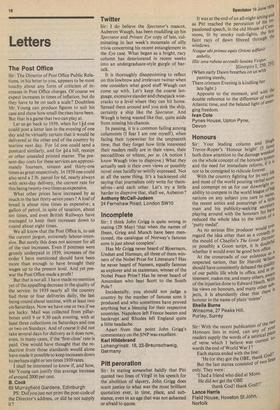The Post Office
Sir : The Director of Post Office Public Relations, in his letter to you, appears to be most touchy about any form of criticism of increases in Post Office charges. Of course we expect increases in times of inflation, but do they have to be on such a scale? Doubtless Mr Young can produce figures to suit his case and show how small the rises have been. But that is a game that two can play at.
Let us go back to 1939, when for 1 id one could post a letter late in the evening of one day and be virtually certain that it would be delivered at the other end of the country by teatime next day. For Id one could send a postcard similarly, and for -id a bill, receipt or other unsealed printed matter. The present-day costs for these services are approximately fourteen, sixteen and thirty-one times as great respectively. In 1939 one could also send a 2 lb. parcel for 6d, nearly always with next-day delivery, the current rate for this being twenty-two times as expensive.
What other prices have increased by as much in the last thirty-seven years? A loaf of bread is about nine times as expensive; a gallon of petrol, in spite of taxation, about ten times, and even British Railways have managed to keep their increases down to round about eight times.
We all know that the Post Office is, to use the current jargon, extremely labour-intensive. But surely this does not account for all of the vast increases. Even if postmen were grossly underpaid in 1939, increases of the order I have mentioned should have been more than enough to have brought their wages up to the present level. And yet prewar the Post Office made a profit !
But that is not all. I have made no mention yet of the appalling decrease in the quality of the service. In 1939 nearly all the country had three or four deliveries daily, the last being round about teatime, with at least two on Saturdays. Now we have one or two if we are lucky. Mail was collected from pillarboxes until 9 or 9.30 each evening, with at least three collections on Saturdays and one or two on Sundays. And of course it did not take several days for delivery as it does now, even, in many cases, if the 'first-class' rate is paid. One would have thought that the reduction from those standards would alone have made it possible to keep increases down to perhaps eight or ten times 1939 rates.
I shall be interested to know if, and how, Mr Young can justify this average increase of around 2000 per cent.
B. Cook 65 Murrayfield Gardens, Edinburgh PS: Did you just not print the post-code of the Director's address, or did he not supply


































 Previous page
Previous page